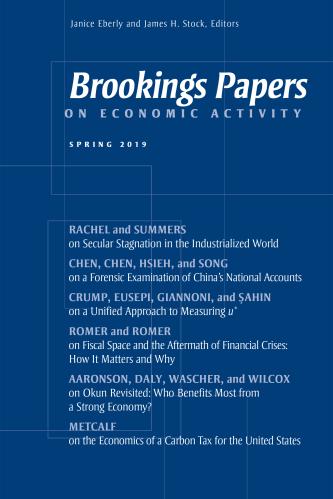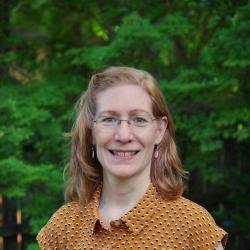This interview is part of the Voices of BPEA series, highlighting women’s leadership in the Brookings Papers on Economic Activity (BPEA), an academic journal published by the Brookings Press twice a year. Each edition of the journal includes five or six new papers on a range of macroeconomic topics currently impacting public policy debates. BPEA is celebrating its 50th anniversary in 2020, and the Spring 2020 conference drafts will be released later this month.
Julie Hotchkiss is a Research Economist and Senior Adviser at the Federal Reserve Bank of Atlanta and Adjunct Professor at Georgia State University. Her major fields of study are earnings and employment differentials across different groups of workers, variations in employment and earnings across time, and policy implications of changes in labor supply. Hotchkiss served as a discussant to the Spring 2019 Brookings Papers on Economic Activity (BPEA) paper “Okun Revisited: Who Benefits Most From a Strong Economy.” BPEA is a vital opportunity for economists to publish research on current policy debates, and the conference celebrates 50 years in 2020.
What has been your experience with BPEA?
I was asked by Jan Eberly, the editor, to discuss a paper that was presented last spring. She was made aware of my research by the president of the Atlanta Federal Reserve, Raphael Bostic, who saw her at the AEA meeting where they were discussing high pressure economic environments. He mentioned my research and she thought that I would be able to contribute as a discussant to one of the papers being presented at the conference.
What has participating in BPEA meant to your career?
Time will tell! I think Brookings has a sterling reputation among economists, so to be able to participate in one of the conversations they’re having has been impactful on me. I hold Brookings in such high esteem; I was very honored to be asked to participate.
In your opinion, what progress has BPEA made in diversifying economics, and what else can and should it do going forward?
I’ve never been aware that there is a need at Brookings to be more inclusive. I follow Brookings on Facebook so I’m constantly seeing posts about different articles and reports and it has never struck me that there is an imbalance in representation. I’m not ultra-sensitive to that kind of thing, but it’s never seemed to me to be a problem.
What would be your advice to women considering a career in economics?
Perseverance. I think that is good advice for anybody. There’s been a lot of publicity lately about women in the economics profession and some of the mistreatment they’ve received. I think being confident, diligent and persistent is what’s most important.
Special thanks to Maureen Heydt, who conducted and transcribed these interviews while interning at Brookings in spring of 2019.






Commentary
Julie Hotchkiss on being new to BPEA
March 9, 2020